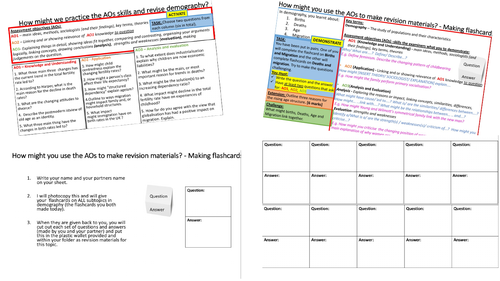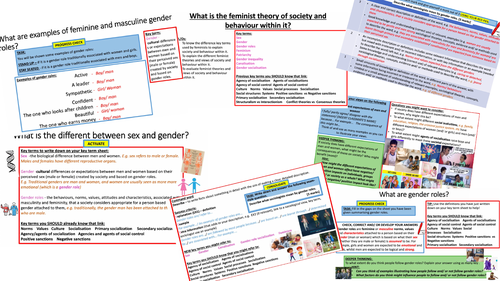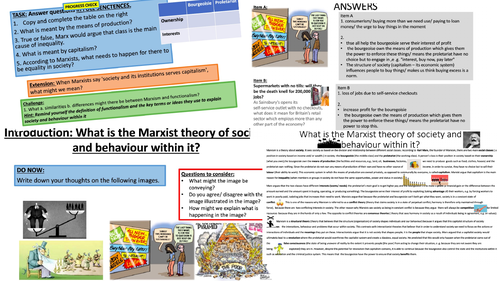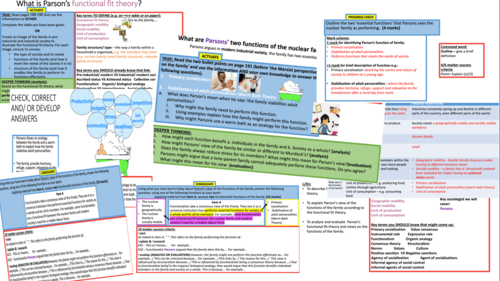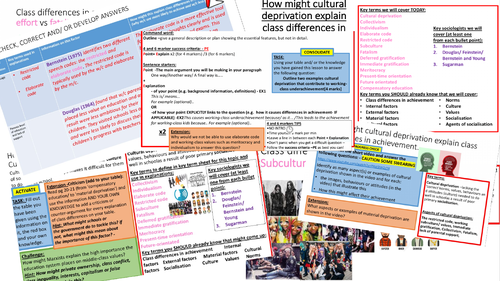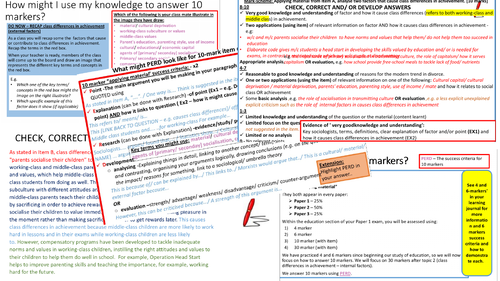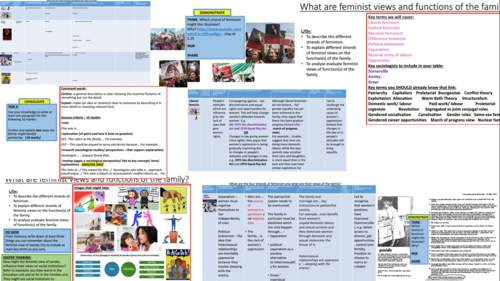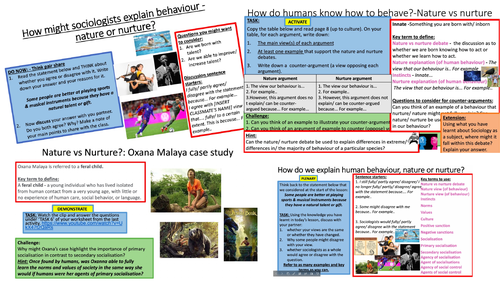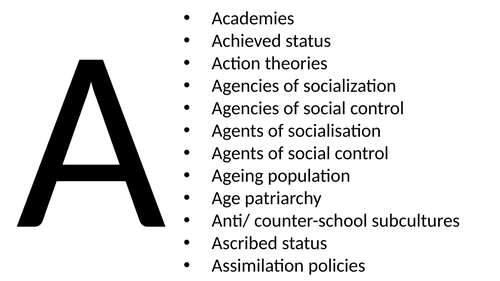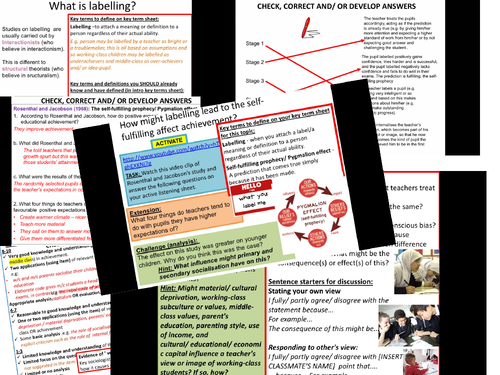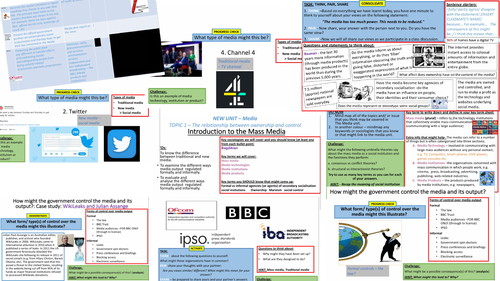
111Uploads
12k+Views
3k+Downloads
All resources

AQA A-level Sociology: Families Topic 4 ‘Demography’ Revision lesson
Detailed and differentiated (up and down), student led lesson created to help students recap key ideas examined in the demography topic of the family unit, make revision materials based on this content and be able to apply this knowledge to exam questions, particularly 10 markers that makes links between topics - This lesson is very helpful for developing the skills students need for to answer ‘Outline and explain’ 10 markers which requires students to demonstrate the ability to connect two elements, aspects, subtopics, or topics to answer the question.
Lesson also recaps the assesment objectives (but can be used to introduce students to the assessment objectives) (AOs – AO1, AO2 & AO3). The lesson requires students to answers questions based on each AO and then provides guidance and support for students to use the AOs to make flashcards (with questions and answers).
**RESOURCES CAN BE FOUND AT THE END OF THE PPT.
**
Bundle

AQA A-Level Sociology PLCs (ALL UNITS) - EDITABLE
** EDITABLE - on a word document**
Personal Learning Checklists for the following AQA A-level Sociology syllabus:
Education
Family
Religion
Media
Crime
Theory and Methods (includes separate PLCs for each sub-topic and a combined PLC.
Methods in context
PLCS for Theory and Methods, Methods in context and Famiy include and page numbers from the Westergaard and Townsend book one and two and Ken Browne ‘Sociology for AQA volume 2’ book (for media) for content that students might find hard to find in the textbook(s).
Topic numbers included for all PLCS.

GCSE Sociology – Introduction to Feminism
explores sex, gender, gender roles, patriarchy, gender inequality as a way to introduce students to the main feminist views of society and ideas.
Includes answers for main activities
3 marker with a success criteria and student friendly mark-scheme
Resources can be found at the end of the PPT (worksheet is in folder).**
Made to meet the AQA spec but can be used (and edited if needed) for other exam boards

AQA A-Level Sociology Beliefs in Society PLC (EDITABLE)
Personal Learning Checklist for the Beliefs in Society unit in the AQA A-level Sociology syllabus. PLC includes topic and page numbers from the Westergaard and Townsend book one and two for content students my find hard to locate.

Introduction to Marxism
Detailed and differentiated student-led lesson that explores capitalism, ownership, interests, structuralism, conflict theories, exploitation as a way to introduce students to the main Marxist views and ideas. Can be used for ANY SPEC. Catered towards A-level students but can easily be simplified and/ or cut down for younger students. Comes with key term sheet.

AQA A-level Sociology Families: Theories of the family – Parson’s view of the family
Detailed and differentiated (up and down) student-led lesson that examines, analyses and evaluates functionalist Parsons view of the family (functional fit theory) and his functions (mainly stabilisation of adult personalities – NOT primary socialisation).
Lesson explores the key terms: Functional fit theory, Stabilisation of adult personalities (Warm Bath Theory), Functional fit theory, Geographic mobility, Social mobility, Unit of production and Unit of consumption.
Lesson makes links to general functionalist key terms and family key terms that students might have previously been taught.
Main activity makes reference to AQA A-level Book 1 by Townsend
***** MOST ACTIVITIES INCLUDE ANSWERS****
Starter assesses prior learning on family topics: couples, childhood and Murdock’s functions.
***** WORKSHEETS AT THE END OF THE PPT**

Sociology Education Class differences in achievement - Cultural deprivation
Detailed and differentiated (up and down), student led lesson that explores collectivism vs individualism, elaborate vs restricted code, subculture, fatalism vs meritocracy, deferred vs immediate gratification, meritocracy, present-time vs future orientated vs compensatory education to enable students to understand the role of cultural deprivation in causing class differences in achievement/ working-class underachievement. Also covers and supports students in answering 4/6 markers using a success criteria and student-friendly mark-schemes.
ANSWERS TO MAIN ACTIVITIES AND EXAM QUESTIONS ARE INCLUDED
COMES WITH FREE A-LEVEL HELP SHEET AND KEY TERM SHEET FOR TOPIC 1 & 2
**Made for AQA A-level but can be easily used for other specs (just need a different source of information/ textbook) differentiated down for GCSE) lesson **
Uses and refers to ’ AQA A Level Sociology Book One Including AS Level: Book one 3rd Revised edition by Rob Webb, Hal Westergaard, Keith Trobe, Annie Townend ’ textbook

How to answer 10 markers for Sociology Education Class differences in achievement (external factors)
Detailed and differentiated (up and down), student led lesson that explores how to answer 10 markers, in particular for education topic 1 - class differences in achievement (external factors). Can also be used as a revision lesson for topic 1 (class diff in achievement -external factors) Includes student friendly success criteria PERD (Point+Explanation+Research+Develop) success criteria and student-friendly mark-scheme.
ANSWERS TO MAIN ACTIVITIES AND EXAM QUESTIONS ARE INCLUDED
**Made for AQA A-level but can be easily used for other specs (just need a different source of information/ textbook) differentiated down for GCSE) lesson **
Bundle

SOCIOLOGY Research Methods - INTRO, PET ISSUES, SAMPLING METHODS
Detailed and differentiated set of student-led lessons made for AQA A/AS-LEVEL SOCIOLOGY but can be differentiated for GCSE (see below-L2) and any SPEC (as it goes through the main methods, terms, issues for social research in general:
Intro to Methods
Explores primary vs secondary methods, quantitative vs qualitative methods, validity and reliability as a way to introduce students to the main main research methods.
Explores practical (time, cost, research opportunity, requirements of funding body & subject matter), ethical (informed consent, confidentiality, harm to participants, vulnerable groups & covert research) and theoretical issues (validity, reliability, representativeness, methodological perspectives, interpretivism & positivism).
*** Catered towards A-LEVEL AQA sociology but if main activity can be replaced, the rest can be used for GCSE and ANY SPEC.**
*** Main activity uses pages 92-94 of the AQA A Level Sociology Book One Including AS Level: Book one 3rd Revised edition by Rob Webb, Hal Westergaard, Keith Trobe, Annie Townend**
explores sampling methods, sampling frame, representative (sample), generalising (findings) and the relationship between these and positivism vss interpretivism and theoretical issues
LESSON COMES WITH ANSWERS

AQA A-Level Sociology Media PLC (EDITABLE)
Personal Learning Checklist for the Media unit in the AQA A-level Sociology syllabus.

AQA A-Level Sociology Families and Households PLC (EDITABLE)
Personal Learning Checklist for the Families and Households unit in the the AQA A-level Sociology syllabus. PLC includes topic and page numbers from the Westergaard and Townsend book one for content students my find hard to locate.

AQA A-Level Sociology Crime and Deviance PLC (EDITABLE)
Personal Learning Checklist for the Crime and Deviance unit in the AQA A-level Sociology syllabus.

AQA A-level Sociology Families: Theories of the family – Feminist views of the family (UPDATED))
Detailed and differentiated (up and down) student-led lesson that examines and evaluates Liberal (Somerville), Radical (Greer), Marxist (Ansley) and Difference feminist views and functions of the family.
Lesson explores the concepts: Political lesbianism , Separatism, Reserve army of labour, Oppression
Lesson makes links to general feminist key terms and other key terms that students might have previously been taught, e.g. Patriarchy, Capitalism, Proletariat, Bourgeoisie, Conflict theory, Exploitation, Alienation, Gendered socialisation Canalisation Gender roles, Warm Bath Theory, Structuralism, etc.
Main activity makes reference to AQA A-level Book 1 by Townsend
***** ALL ANSWERS INCLUDING ANAYSIS FOR TABLE ACTIVITY NOW INCLUDED ****
NOW INCLUDES MODEL PARAGRAPH FOR 10 MARKER
***** WORKSHEETS AT THE END OF THE PPT****

AQA A-Level Sociology Theory and Methods PLC (EDITABLE)
Personal Learning Checklist for the Theory and Methods unit in the AQA A-level Sociology syllabus. PLC includes topic and page numbers from the Westergaard and Townsend book one and two for content students my find hard to locate.

AQA A-Level Sociology Methods in Context PLC (EDITABLE)
Personal Learning Checklist for the methods in context unit in the the AQA A-level Sociology syllabus. PLC includes topic and page numbers from the Westergaard and Townsend book one for content students my find hard to locate.

Nature vs nurture - How might we explain behaviour?
Detailed student-led lesson that explores the nature vs debate, norms, values, socialisation (primary/secondary) and social control as an introduction to Sociology. Uses page 8 of the AQA A-level Book 1 by Townsend to introduces students to the nature vs nurture debate but this can be replaced and the rest of the lesson can still be used. Comes with worksheet used for two of the activities and key term sheet for the lesson. Can be used for both GCSE and A-level.

Sociology Display - A-Z Key terms (YEAR 1)
A-Z list of key sociological terms for:
Education
Family
Research Methods
Could not think of key terms for letters: W, K, J, Z, Y, Z
Made for AQA A-level but can be modified for ANY SPEC and for GCSE.

Sociology Education Class differences in achievement - Labelling
Detailed and differentiated (up and down), student led lesson that explores labelling, self-fulfilling-prophecy/ pygmallion effect, determinism and interactionism to enable students to understand the role of labelling in causing class differences in achievement/ working-class underachievement/ middle-achievement.
**ANSWERS TO MOST ACTIVITIES **
COMES WITH FREE A-LEVEL HELP SHEET AND KEY TERM SHEET FOR TOPIC 1 & 2
**Made for AQA A-level but can be easily used for other specs (just need a different source of information/ textbook) differentiated down for GCSE) lesson **
Uses and refers to ’ AQA A Level Sociology Book One Including AS Level: Book one 3rd Revised edition by Rob Webb, Hal Westergaard, Keith Trobe, Annie Townend ’ textbook

AQA A-Level Sociology Education PLC (EDITABLE)
Personal Learning Checklist for the education unit in the the AQA A-level Sociology syllabus.

Introduction to the Mass Media (& informal and formal controls of output/ content)
Detailed and differentiated (up and down), student led lesson that introduces students to the different forms of mass media and formal and informal methods used by the government to control media output formally and informally.
Examines the following concepts:Mass media, Media technologies , Media institutions, Media products.
**Made for AQA A-level **but can be easily used for other specs
ANSWERS TO MAIN ACTIVITIES INCLUDED
RESOURCES FOR LESSON CAN BE FOUND AT THE END OF PTT
**Based on content in textbook - 'SOCIOLOGY For AQA Volume 2 by Browne, Blundell & Law ** - BUT LESSON REQUIRES NO TEXTBOOK

